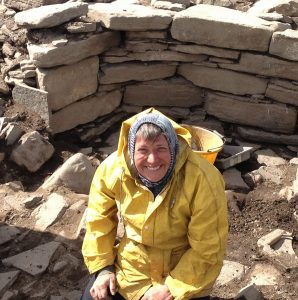Sarah George is a subject librarian at the University of Bradford. In 2017 she gained National Teaching Fellowship of the Higher Education Academy (HEA) for recognition of the information literacy work that she is carrying out in her workplace. Such information literacy work allows librarians working in Higher Education to apply to the HEA to seek accreditation for their teaching. Read on to find out more about Sarah’s experiences and consider, if you are working in Higher Education, whether you might also want to apply to the HEA yourself to seek accreditation for your teaching.
Sarah George, subject librarian at the University of Bradford talks about HEA teaching accreditation and promises tears, sweat and postnominals!
I have been a subject librarian at the University of Bradford since 2005, supporting Archaeology, Chemistry, Forensics and, latterly, parts of engineering. Before coming here I had been a field archaeologist, school librarian, special collections assistant and the world’s worst lab technician! In this post I talk about how my information literacy work helped me to achieve HEA accreditation, first as a Senior Fellow and recently as a National Teaching Fellow, and encouraging library colleagues to do likewise!
Business as usual: branch libraries and breaches
Looking back, it probably all started in the summer of 2011. We were gearing up for a summer of moving a branch library and re-classifying half of the stock whilst dodging snidey comments from fellow commuters about universities having 3 months’ summer holidays, business as usual in a smallish, busy academic library. Round about June we were told we would also need to have a plagiarism induction ready to deliver to all new students by September. The plagiarism induction, duly hammered together in the start-of-year maelstrom, went out to some 3000 new students. The library was in the unusual position of also running the disciplinary sessions for those found in breach of plagiarism regulations, and by the start of the 2012/13 session we started noticing a distinct and welcome drop in breach referrals. We thought this worthy of investigation and in 2012 I presented my first ever conference paper (at the ripe age of 41!) to the NoWAL conference. Although the concept of an induction was widespread, it seemed that our involvement with both ends of the process and the overview we gained of the link between induction and reduction in breaches was unusual. The NoWAL paper evolved into an article for the New Review of Academic Librarianship and various other conference papers. This work won our group one of Bradford’s first Vice Chancellor’s Teaching Excellence awards in 2014.
HEA accreditation: the quest for postnominals
Coincidentally, on the day we were awarded the VC’s Teaching excellence awards, I finally achieved Senior Fellowship of the HEA, for which the plagiarism reduction work had been one of my case-studies (the other was on Enquiry-Based Learning to teach Historic Environment Record use to archaeology first years). One reason why the SFHEA was a “finally” was due to my difficulty in disentangling my contribution to what was very much a team effort. I think this is a frequent problem when library staff apply for recognition – we’re collaborative beings and don’t like to claim credit for other people’s work. My mentor for Chartership wisely reminded me that this is not group work – no-one else gets marked down because of my claims. My mentor for Senior Fellowship heavily red-pencilled my statement, suggesting every “we” become “I”. My final claim made me want to punch myself hard in the face, which I now take as a good sign that it’s ready!

Going National
My elders and betters suggested that the combination between the SFHEA and VC’s award was sufficiently eye-catching in a librarian to be worth putting me forward for the 2015 National Teaching Fellowship Scheme. I was selected after an internal competition to be one of three candidates put forward by Bradford. I had three months in which to polish my application based on similar claims to my SFHEA but also including “things librarians don’t usually do” such as my habit of popping off on fieldwork with the archaeology students. I also started some other projects around accessibility (auditing the accessibility of e-books) and information literacy (chemistry students’ attitudes to library instruction). I also used my application as a lever to address a long-standing bugbear of mine, namely that we then had 14 different referencing styles, 9 of them subtle Harvard variants. My first application was not successful so I was thrown back into the process again, re-writing my claim whilst pursuing the other projects to bolster it, reasoning that if I didn’t get it at least there would be some useful outcomes (and, indeed, we now have only 3 referencing styles. That took a group of dedicated academics and cake. A lot of cake). After my second application failed I asked the scheme administrator to shoot me in the head rather than make me do it again. She replied that I was going to be put in again but she was happy to shoot me in the head too if it would help. The third application also involved writing up my previous projects and presenting them at conferences to demonstrate their impact, and that (or something!) worked when I became one of 55 new NTFs in 2017.
What’s in it for you?
I won’t pretend that, for me and all of my colleagues who’ve achieved HEA recognition, it wasn’t a lot of work. But I will claim that it’s invaluable for benchmarking the quality of our teaching in a way that the non-librarians who decide our budgets and futures will understand and value. When I started at Bradford in 2005 the library was doing some fantastic teaching but we made little impact in the wider university. Now, partly due to our HEA accreditations, we mentor and peer review academics, sit on accreditation panels, review NTF applications and a host of other teaching activities that mean far more to our paymasters than, for instance, chartership (sorry, CILIP!). I often feel that, as a profession, librarians are too inward-looking in our networking and CPD, and as a result other professions have little understanding of what we do. I would urge librarians in Higher Education to consider working towards HEA accreditation, despite the HEA website suggesting that library staff can only achieve the lowest grade of Associate Fellowship, most of our subject librarians either have Fellowship or are working towards it, and Senior Fellowship is entirely possible if you’re prepared to be a pest and stick your nose where wouldn’t normally be (that’s how I interpret “influencing others”, anyway!). We’ve got an online support group for librarians working towards HEA accreditation, which will (hopefully!) start running face-to-face events in 2018. The list address is LIS-HEASUPPORT@JISCMAIL.AC.UK, or feel free to contact me directly on s.george@bradford.ac.uk.
Further reading
George, S. (2015) On their own turf: taking the library into the field. CILIP Update June 2015, 44-45. https://bradscholars.brad.ac.uk/handle/10454/7393
George, S., Costigan, A. and O’Hara, M. (2013) Placing the Library at the Heart of Plagiarism Prevention: The University of Bradford Experience. New Review of Academic Librarianship 19 (2), 141-160. https://bradscholars.brad.ac.uk/handle/10454/5616
George, S. and Coussement, K. (2016) Accessibility for all: engaging library staff in auditing electronic resources. ALISS Quarterly 11 (3), 24-30. https://bradscholars.brad.ac.uk/handle/10454/8365
George, S. and Munshi, T. (2016) Making Students Eat Their Greens: Information Skills for Chemistry Students. Issues in Science and Technology Librarianship Fall 2016. http://istl.org/16-fall/refereed1.html
George, S. and Rowland, J. (2017) Referencing: student choice or student voice? Educational Developments 18 (2), 24-28. https://bradscholars.brad.ac.uk/handle/10454/12641
The Information Literacy Group Website editorial team is always delighted to accept any case studies on information literacy for publication on the website. Do you feel like you would like to contribute a case study? Please see our guidelines or contact us for more information.


I loved this piece – and great that librarians are getting the recognition they deserve at the University